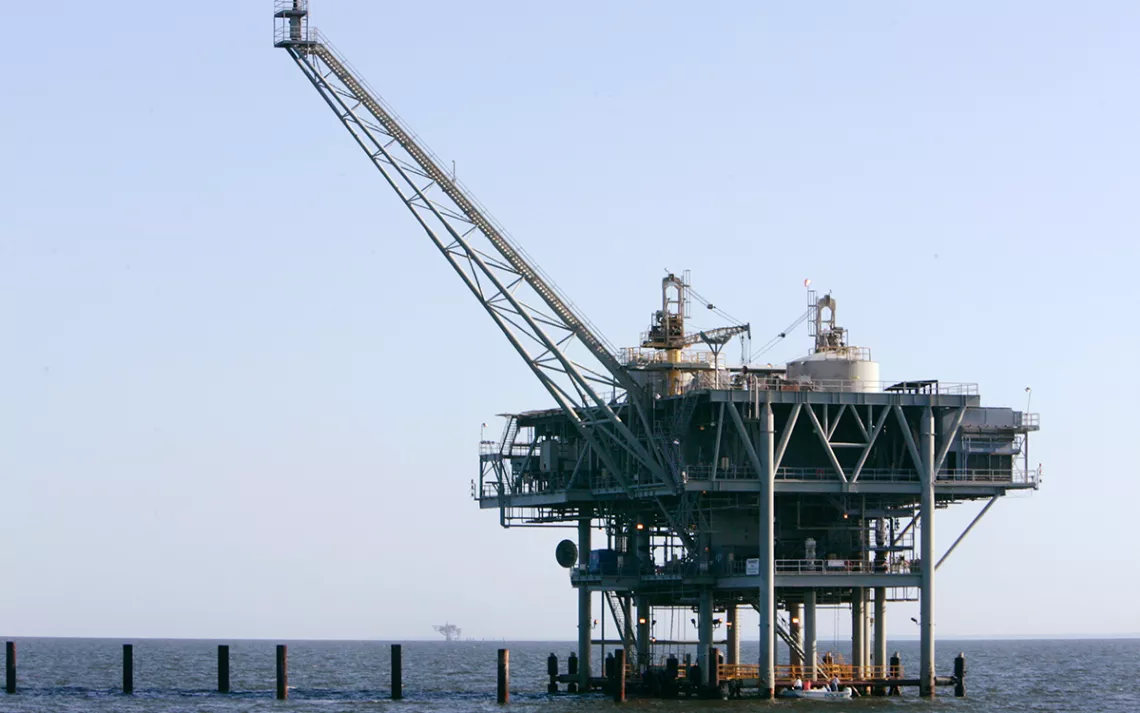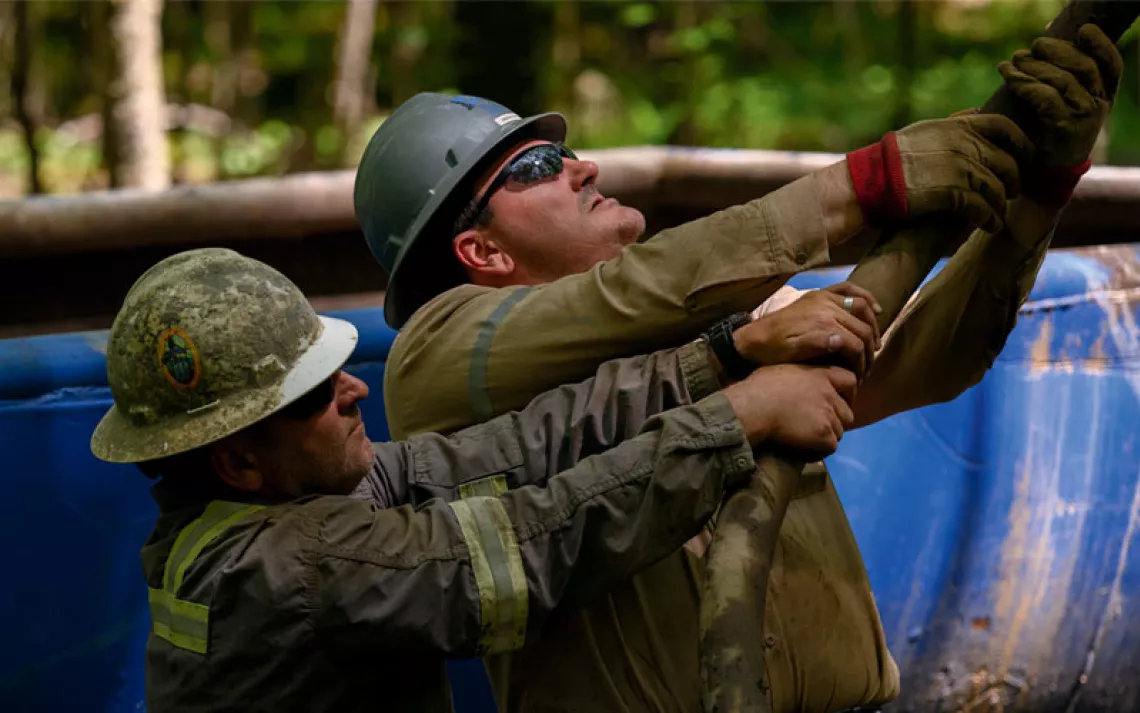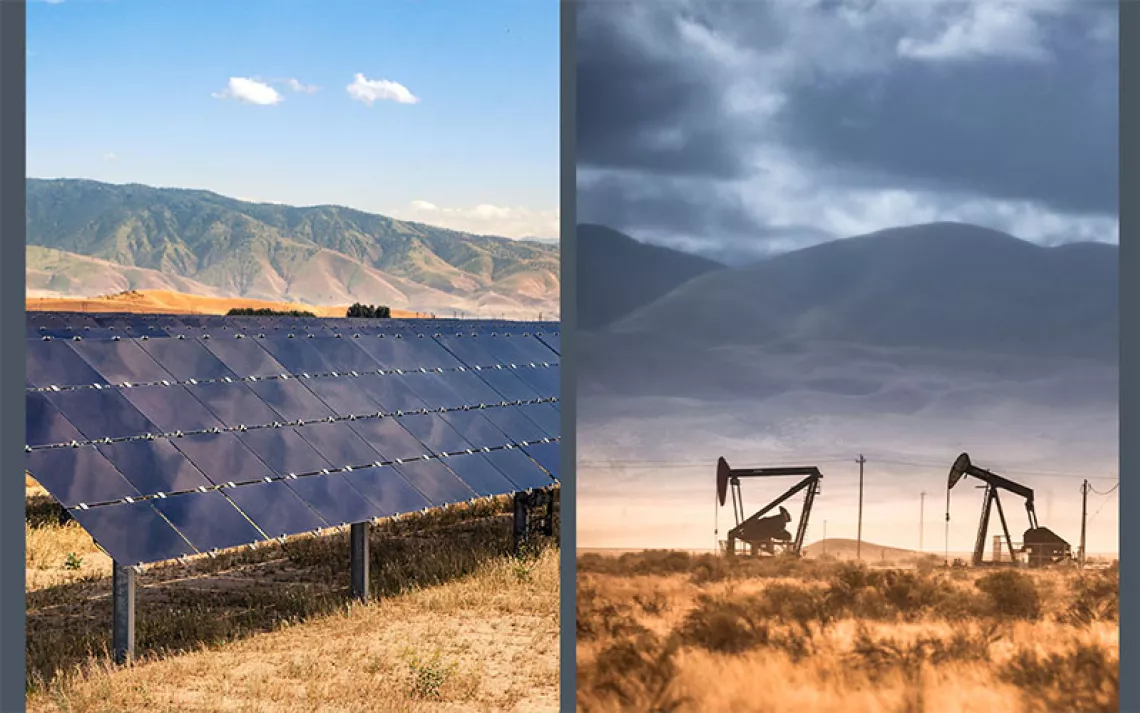Environmental Groups Sue Interior Department to Halt Oil and Gas Lease Sale in the Gulf of Mexico
The upcoming sale was demanded by Senator Joe Manchin as a condition of passing the Inflation Reduction Act

A natural gas platform off the coast of Fort Morgan, Alabama. | Photo by Rob Carr/AP File
|Environmental groups, including the Sierra Club, filed suit in federal court this week to block the Biden administration’s plan to hold a massive oil and gas lease sale in the Gulf of Mexico later this month. The groups charge that the sale violates federal law by not adequately addressing how the oil and gas extraction could impact climate stability, the health of residents living in vulnerable coastal Gulf communities, and the existence of the critically endangered Rice’s whale, a species unique to the Gulf that was only identified in 2021 and whose population is limited to just 51 individuals.
The sale would open 114,062 square miles to drilling across the Gulf and is expected to produce up to a billion barrels of oil and 4.4 trillion cubic feet of fossil gas. “Our climate can't afford more oil and gas leasing,” Kristen Monsell, a senior attorney with the Center for Biological Diversity, a party to the suit, told Sierra. “We need to be rapidly transitioning toward renewable, sustainable energy, not opening up more of our ocean waters to oil and gas drilling.”
Mandated by the Inflation Reduction Act, the sale was a political trade-off to get the vote of West Virginia senator Joe Manchin, Monsell said. “It’s infuriating to see Democrats playing politics with our climate and our ocean environment.”
>It’s also ironic, given that in his State of the Union address in January, President Joe Biden called on all Americans to “face reality” in dealing with what he characterized as “the climate crisis … an existential threat.”
Many marginalized communities already bear the brunt of the worst effects of changing climate, such as flooding caused by sea level rise and hurricanes. Beverly Wright, executive director of the Deep South Center for Environmental Justice, reminded President Biden of that fact when he signed the IRA into law last August. There were benefits to the IRA, Wright acknowledged, but added “its funding for dirty energy puts a target on Black and other communities of color” located on or near the Gulf coast. “I call on President Biden to deliver on his promise to our communities who are fighting for environmental and climate justice.”
A key charge in the lawsuit is that the Bureau of Ocean Energy Management, which is part of the Department of the Interior, violated federal law in preparing the sale’s environmental impact statement. One example CBD’s Monsell points to is BOEM’s failure to address potential health effects on communities near refining facilities.
“The EIS said, essentially, ‘Oh, there’s already a lot of oil infrastructure there. So this additional lease is not going to cause any additional harm,’” Monsell said. “It’s a slap in the face to those communities who are getting sick and dying because of toxic pollution from the fossil fuel industry. It’s also unlawful.”
Last October, more than a hundred scientists wrote an open letter to the Biden administration stating that any increased oil drilling jeopardizes the survival of the Rice’s whale. Without a change in policy, they warned, “the United States is likely to cause the first anthropogenic extinction of a great whale species.” Among other dangers, the scientists cited the threats posed by oil companies’ use of seismic airgun surveys and the risk of ship strikes from increased traffic in the Gulf. Oil spills pose a singular threat to the species. The government’s own study of the 2010 Deepwater Horizon disaster determined that the oil spill killed 20 percent of the Gulf whale population outright while also contributing to lowered birth rates and increased incidence of disease. “With [whale] abundance so low,” the scientists wrote, “the loss of even a single whale threatens the survival of the species.”
Renewable energy advocates are also upset by how the oil and gas lease sale has delayed the first-ever auction for wind energy projects in the Gulf of Mexico. Nearly 700,000 acres off the coast of Louisiana and Texas were expected to be auctioned off last December to build wind turbines capable of producing enough electricity to power 3 million homes. But after the announcement of the oil and gas lease sale, the administration pushed back the wind power auction by six months.
George Torgun, a senior attorney with the Oceans Program at Earthjustice, calls the sale dangerous and unlawful. Perhaps the worst part is that approving new leases is also unnecessary. “There will be oil and gas production from existing leases for the next few decades, even if we had stopped leasing today,” he told Sierra. “And yet we’re continuing to pull these lease sales even in the face of our climate crisis.”
CBD’s Morell also objects to the business-as-usual oil lease sale. “Especially,” she added, “from an administration that has pledged to address the climate crisis, has pledged to address environmental injustice, and has pledged to address the extinction crisis. And yet, when it comes time to actually do so, its actions don't match its words.”
But Morell and other environmentalists aren’t about to give up.
“The only way to truly mitigate the risk of offshore oil and gas leasing is to stop doing it, and phase it out of our oceans,” she said. “And that's what we'll keep fighting for.”
 The Magazine of The Sierra Club
The Magazine of The Sierra Club



